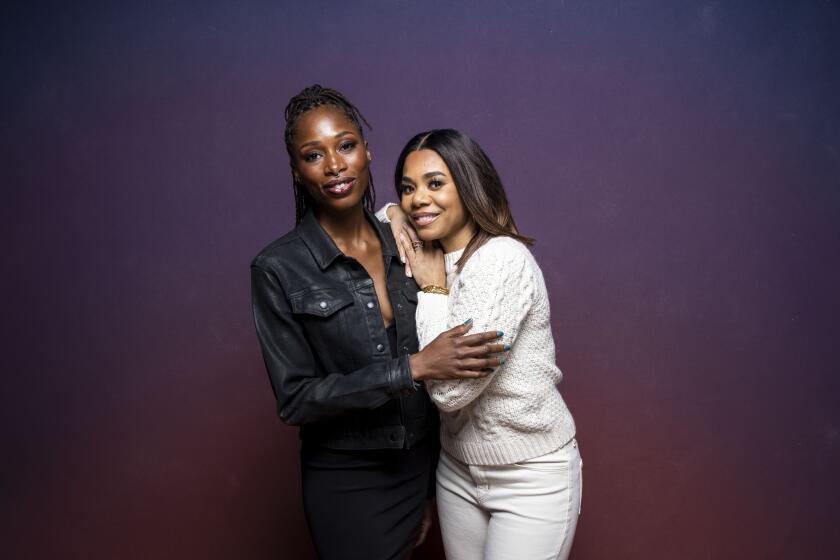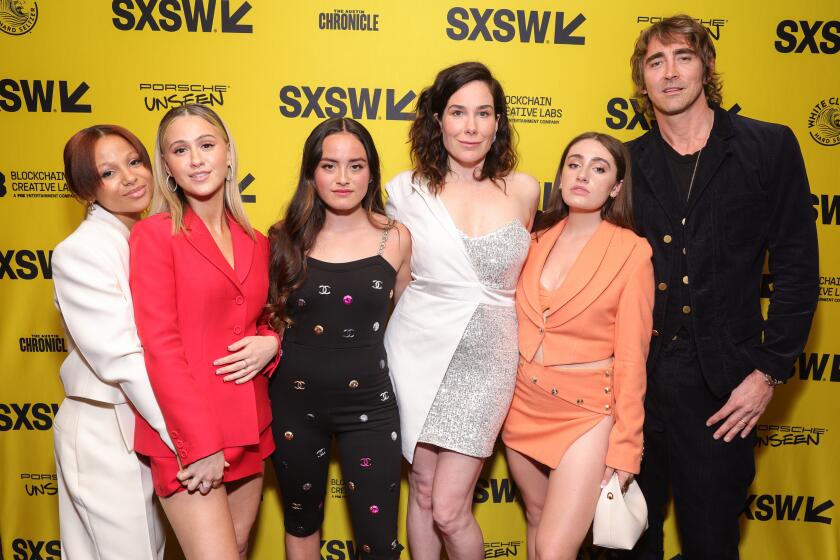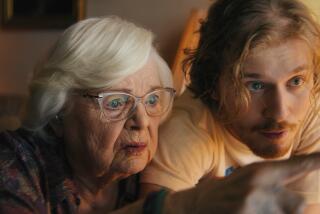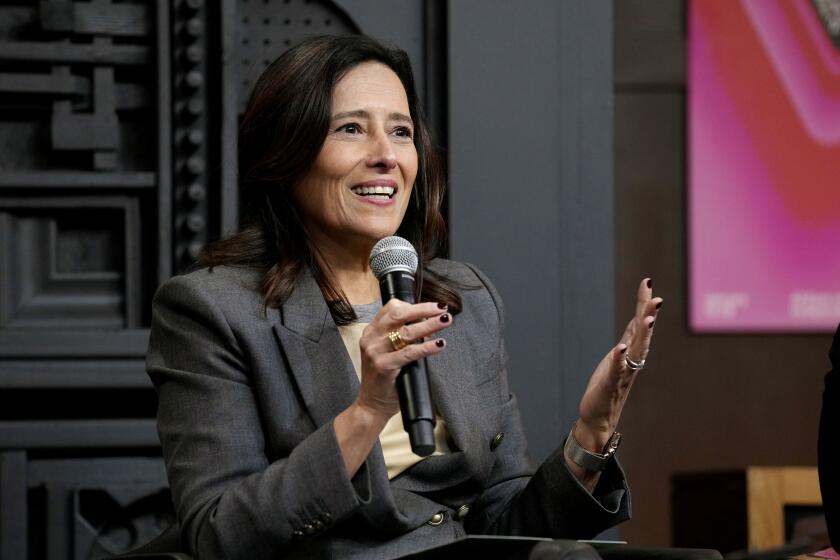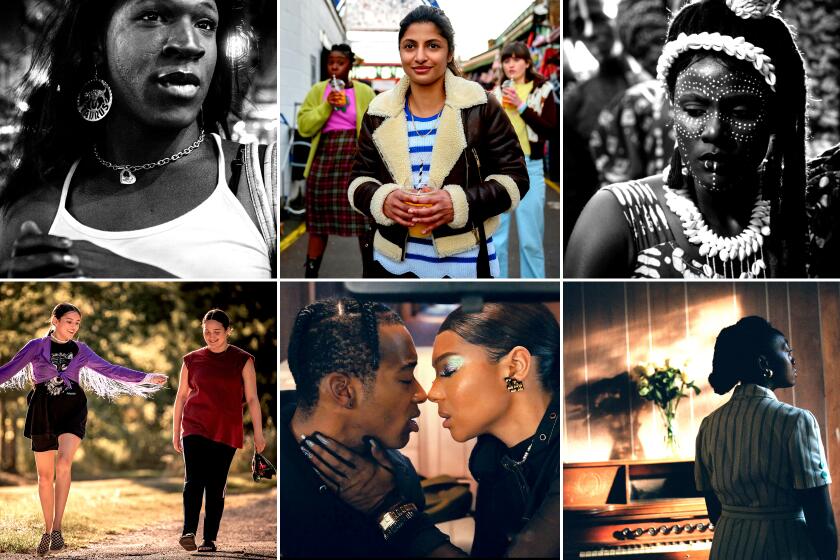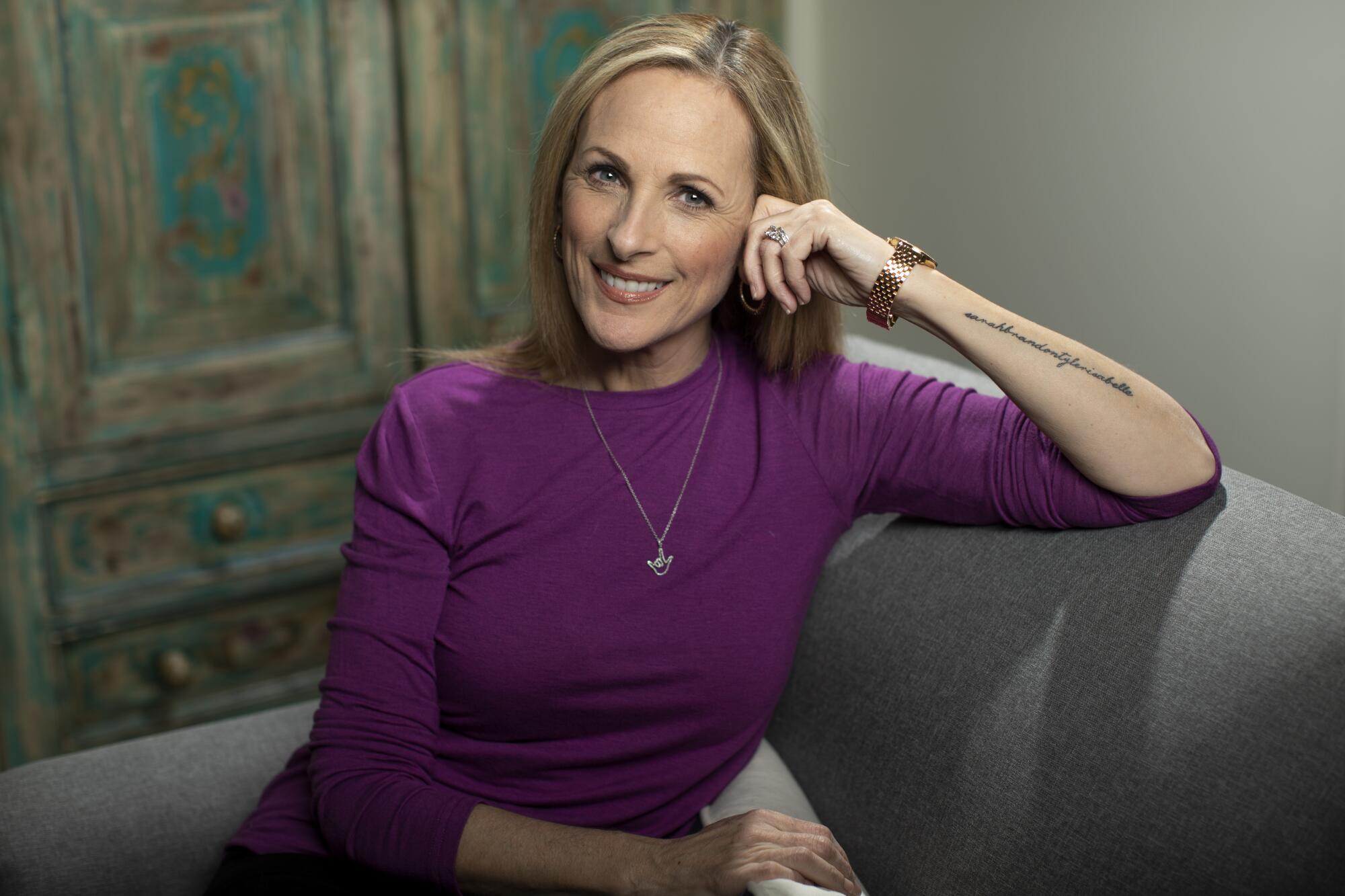
Filmmaker Siân Heder tipped me off about Marlee Matlin, saying that the moment you meet her, she’ll ask 10 questions. Sure enough, when we connect via Zoom, she takes one look at the bookcases in the background and begins, asking through her sign language interpreter and confidante Jack Jason if I’ve read every book on those shelves.
Noticing the Oscar in the background of her shot, I counter by asking Matlin if she frames all her video interviews just so, to spotlight the Academy Award and, yes, the Golden Globe (the Oscar’s “little cousin,” as she puts it) she won at age 21 for “Children of a Lesser God.”
Matlin’s Oscar placement, it turns out, can be strategic. Matlin works with the Academy of Motion Picture Arts and Sciences, advocating for the use of subtitles and captions on for-your-consideration screeners (a rule requiring them was finally passed this year) and advising on the long-delayed Academy Museum of Motion Pictures. During a recent meeting about the museum, talk turned to a room devoted to special moments in Oscar history, like when Hattie McDaniel became the first Black person to win. Several other historic firsts were cited, but there was no mention of Matlin being the first (and only) deaf performer to earn an Academy Award.
Matlin waited for a lull in the conversation and then grabbed her Oscar, asking, “Well, what was this for?”
“You should have seen everyone’s faces in the Zoom meeting,” Jason says, laughing.
“I did it with a sense of humor,” Matlin says. “At the same time, there was a little, ‘Hellooooo, don’t forget.’”
In one sense, Matlin’s long career as an actor and an activist has been a continuous run of her rolling up her sleeves, making some noise and telling Hollywood not to forget. And as Heder notes, that advocacy has come at something of a cost.
“She’s just this huge talent, an Oscar winner, but her opportunities have been limited because she’s been in countless situations where she has been asked to consult on a role or to teach a hearing actress about deaf culture,” Heder says. “She’s the most famous face within the deaf community, so she ends up being a spokesperson for a lot of the issues that the community is facing.”
Matlin’s latest movie, “CODA,” serves as both a showcase for her talent and yet another example of her determination to tell organically authentic stories about the lives of human beings who happen to be deaf. It premieres Thursday on the opening day of this year’s virtual Sundance Film Festival, weighing in as a crowd-pleaser that should be one of the hottest acquisition titles at the event.
Written and directed by Heder, “CODA” (child of deaf adults) follows Ruby (Emilia Jones), the only hearing member of a deaf family who, at 17, dreams of going away to college and pursuing her passion for singing. But she’s torn. Her family runs a fishing business and depends on Ruby to navigate the world outside the home.
All of the deaf characters — Ruby’s father, Frank (Troy Kotsur); mother, Jackie (Matlin); and brother, Leo (Daniel Durant) — are portrayed by deaf actors, and American Sign Language is subtitled, rather than translated, highlighting its vibrancy as a form of communication.
A wide range of narrative and documentaries highlights to watch for at the first virtual Sundance Film Festival.
Matlin was the first actor to join “CODA” and stuck with Heder through a development process that had financiers balking at casting deaf actors in lead roles. Finally, Matlin issued an ultimatum: Hire deaf actors or I’m out.
“For the first time in a long time ... in fact, for the first time since my first film (‘Children of a Lesser God’), I felt that audiences would really see deaf people in a film,” Matlin says of her “obsession” with getting “Coda” made. “There are so many levels for people to identify with and, for people with no connection, who have never met a deaf person, to see sign language, to see deaf people in normal, day-to-day settings. ... People think that deaf people are monolithic in terms of how they approach life. And this film bursts that myth.”
“But to burst that myth,” Matlin continues, “it had to be told as authentically as possible. And it’s strange because studios clearly have the ability to greenlight a film and cast whomever they want, and there continues to be a lack of awareness that you can tell universal stories with deaf characters.”
Matlin’s first scene in “CODA” takes place in a doctor’s office. Frank emphatically signs a series of symptoms. The diagnosis? Jock itch. The physician, through Ruby, tells them they have to abstain from sex for two weeks. Their reply: “Impossible.” “Can’t do it.” It’s an introduction to a couple who still find each other irresistible after decades together, an attraction that, of course, mortifies their teenage daughter. (Ruby initially translates the doctor’s diagnosis as they “can never, ever have sex again.”)
Jackie’s brio, Heder says, might run counter to the public perception of Matlin, which, thanks to all those years playing pollster Joey Lucas on “The West Wing,” is “very put together and classy.” Matlin herself disabuses you of that image almost immediately, swearing and telling dirty stories. “A total ballbuster,” Heder says, laughing, “and just hilarious.”
Matlin has been married for 27 years, meeting her husband, Kevin Grandalski, when he was a Burbank police officer monitoring traffic for her television show “Reasonable Doubts.” Matlin loves sharing the story of that first encounter.
“I became friends with a lot of cops, and one day I got to work and saw my friend in uniform and I went up and gave him a big hug and he stiffened up and I realized it was the wrong cop ... because of course they all look the same with their moustaches,” Matlin says. “And my friend sees this and goes, ‘Stay away from him.’ ‘No, no. You think I’m going to listen to you?’ And the rest is history.”
The couple have four children — two boys, two girls — 25 to 17. None is deaf (and neither is her husband), but, unlike, Jackie, Matlin has no hang-ups with raising hearing children — other than the usual frustrations that every parent of adolescents and young adults faces.
“The kids like to talk to dad about whatever’s going on in school because I think they feel like, if they talked to me, there’s a different energy in sign language,” Matlin says. “And it also probably has to do with the fact that I’m their mom and they’d rather go to dad than talk to mom.” Matlin laughs. “Or sometimes, I’m like, ‘Wait a minute. Is it because I’m failing as a mom because I’m not encouraging you to share with me.’ I don’t know. Everyone feels that way as a parent. But at the same time, I always want to make sure they don’t treat me any different in the household.”
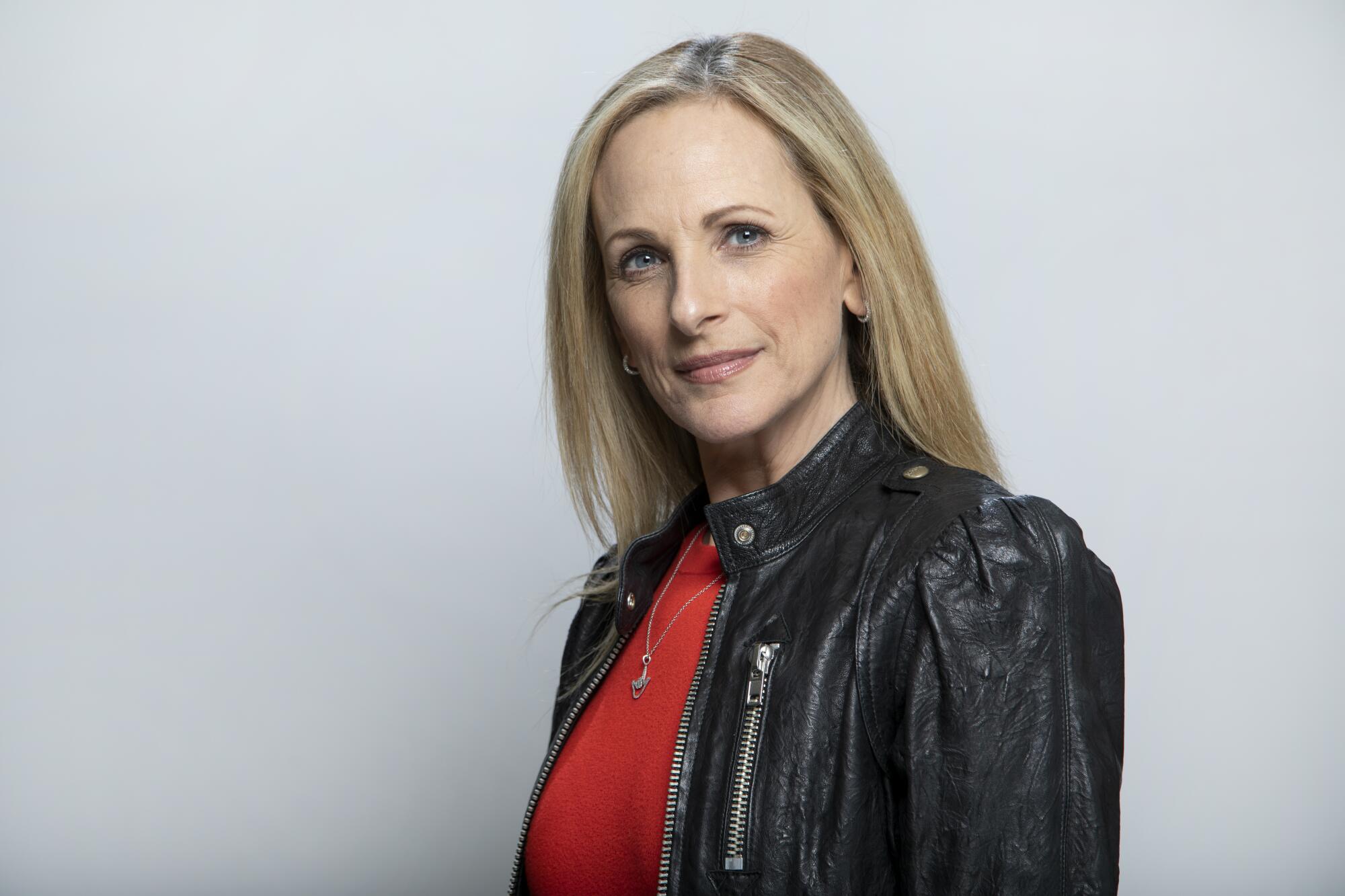
Matlin moved to Los Angeles from New York not long after winning the Oscar. She was escaping a relationship with her “Children of a Lesser God” co-star William Hurt, who, she alleges in her 2010 memoir “I’ll Scream Later,” physically and mentally abused her. Before arriving, she called Henry Winkler and asked if she could crash at his Toluca Lake home for the weekend. Matlin met Winkler when she was 12 at a play at Chicago’s International Center on Deafness and the Arts. He encouraged her to follow her heart and pursue acting, and they kept in touch.
“So I showed up with the Oscar in my hand and he smiled, and he and his wife, Stacey, took me in,” Matlin remembers. “He said, ‘Let’s think it over for the weekend.’ And I ended up two years later still being there for the weekend.”
Matlin’s career had stalled after “Children of a Lesser God,” and she was plagued with self-doubt. She couldn’t forget the words of film critic Rex Reed who said she had won the Oscar only out of a pity vote and that giving it to her was a waste because there aren’t many (if any) roles for a “deaf mute” to perform.
“That stupid, f—ing ...,” Matlin says. “Clearly authenticity wasn’t in his vocabulary.”
More than three decades later, Matlin is still here, having fashioned a singular film and television career. And now, with “CODA,” she believes she has the perfect bookend to go with her film debut.
“I haven’t been this excited about a movie for so long,” Matlin says. “I hope that it will create a tidal wave.”
More to Read
Only good movies
Get the Indie Focus newsletter, Mark Olsen's weekly guide to the world of cinema.
You may occasionally receive promotional content from the Los Angeles Times.
